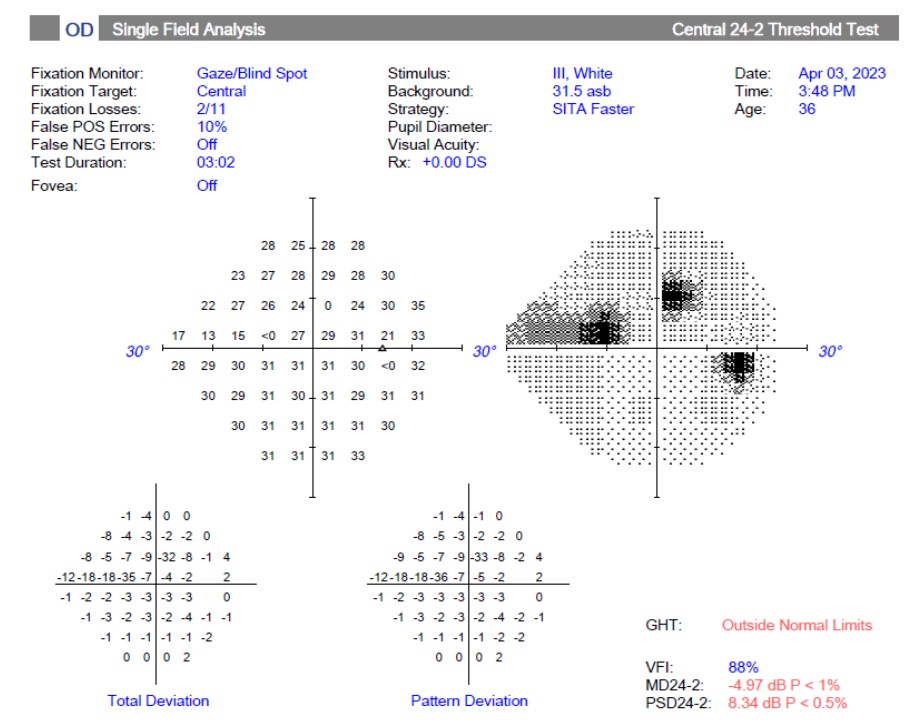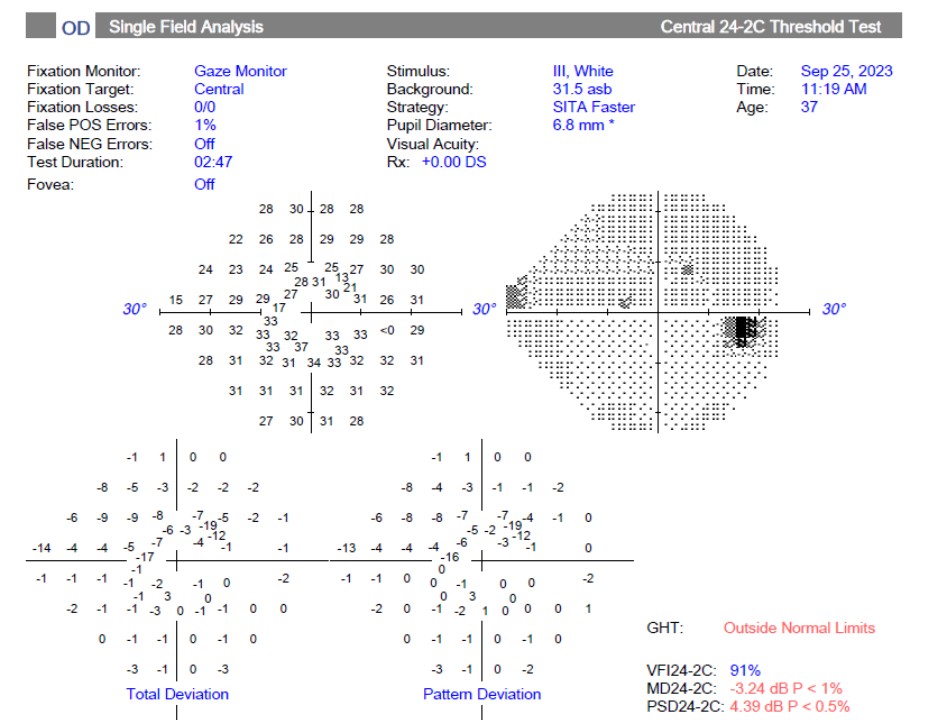I previously highlighted glaucoma neuroprotection with nutrient supplements as a potentially contentious topic.
Ultimately, the goal of glaucoma treatment is to prevent glaucoma blindness, and everyone rightly emphasizes eye pressure as the most important risk factor to treat.
But no one emphasizes that glaucoma progression can still occur despite the best controlled eye pressures.
And there is almost no emphasis on addressing the other nine important biocellular mechanisms of eye aging that contribute to glaucoma:
- Oxidative stress
- Chronic inflammation
- Neuronal transmission failure
- Impaired glucose metabolism
- Mitochondrial dysfunction
- Vascular dysregulation
- High homocysteine levels
- Stress-related cellular damage
- Macular pigment deficiency
If we do not provide the necessary nutrients to combat aging, how can we expect the eye and optic nerve to be more resilient against insult and to recover better when damage has occurred?
For the best chance of preventing glaucoma blindness, you must successfully treat your eye pressure and effectively neuroprotect against these biocellular processes of aging.
My professional opinion therefore is that neuroprotection are essential components of proactive glaucoma care, alongside conventional medical and surgical therapies.
Many nutrients, botanical extracts, and vitamins have been investigated as a potential neuroprotective treatment for glaucoma. However, only some have shown promise.
This is unsurprising because the targeting is not comprehensive or complete enough. Most of these nutraceutical supplements only target at most up to three of the biocellular risks listed above.
If you have a roof that is leaking from ten holes and you only patch three of them, your roof is not going to stop leaking.
The best glaucoma supplement to take is the one that provides comprehensive neuroprotection from the key biocellular risks that contribute to glaucoma progression.
Dr Brian Ang, Proactive Glaucoma Care Advocate & Glaucoma Surgeon
In this post, I list my top 4 glaucoma supplements for neuroprotection to optimize your vision health, as part of a holistic, proactive glaucoma care approach.
1. Nutravision (Australia)
(Disclaimer: I am part of the team of leading Australian clinicians and scientists that formulated and developed Nutravision)
Nutravision is the first glaucoma supplement currently available globally that delivers 360-degree neuroprotection by tackling all the nine important biocellular mechanisms of eye aging (ten if you include elevated eye pressure).
This is achieved by combining quality assured ingredients that have already been individually clinically proven to deliver significant outcomes in individuals with glaucoma:
So when taken together, what you get with Nutravision is quite simply the most comprehensive neuroprotection supplement for glaucoma currently available worldwide.
Here is another review of Nutravision from a patient with advanced glaucoma. You can read HR’s full story here.
Case Study
Below is yet another case example of a patient of mine taking Nutravision for glaucoma neuroprotection alongside his usual eye drops, with his visual field test results before and after taking Nutravision.

Since his glaucoma was diagnosed a few years ago, he had been using eye drops to reduce his eye pressure and to try to prevent his glaucoma field loss from deteriorating.
His initial visual field shows 88% of his visual field remaining.
When the Nutravision supplement was launched in 2023, he started taking it alongside his usual glaucoma eye drops.
The main reason for taking Nutravision was because he wanted to do everything he possibly can for his eyes. He wanted to not only stabilize his glaucoma, but also to give his retinal ganglion cells the best possible chance of restoring function and potentially even improving his vision.
As a busy professional, it was time-saving and convenient for him to take one Nutravision capsule daily rather than to purchase and take the 10 individual ingredients separately.

Fast forward 3 months later, his visual field test has shown an remarkable transformation, with improvement in his visual field to 91% and significant reduction in his glaucoma-related blind spots.
Given that with glaucoma the most you can expect is either worsening of the visual field or stabilization at best, this is a truly incredible outcome.
This case example and the video above highlight why all glaucoma patients should consider taking supplements for proactive glaucoma neuroprotection alongside their conventional treatments.
Please note that individual results to supplementation will vary, and not everyone will achieve similar outcomes from taking Nutravision for glaucoma neuroprotection.
Nutravision in particular, may provide other benefits beyond the visual field, including reduction in dry eye symptoms, stabilization of the eye pressure and general health benefits.
2. Bilberry-maritime pine bark combination

The phytonutrient combination of bilberry fruit extract and maritime pine bark extract taken orally has shown significant eye pressure reduction in randomized clinical trials.
A trial published in 2008 found that after three months of treatment with bilberry-maritime pine bark, the eye pressure decreased by an average of 3 mmHg, in almost all (19 out of 20) subjects). There was no change in pressure in the control group.
The combination of bilberry-maritime pine bark with latanoprost eye drops achieved better pressure reduction than either alone, from 38 mmHg to 24 mmHg, after six weeks.
Possible alternative:
Some have asked me if there is an alternative supplement to the bilberry-maritime pine bark combination, and the answer is yes.
The beneficial effects of this combination are due to anthocyanins from bilberry and proanthocyanidins from maritime pine bark.
If maritime pine bark is difficult or too expensive to source, then another excellent source of proanthocyanidins is grape seed extract. In fact, grape seed extract is the best natural source of proanthocyanidins, containing even more of these amazing antioxidants than maritime pine bark (95% vs 80%).
It is logical that a natural botanical supplement containing bilberry combined with proanthocyanidins, whether from maritime pine bark or grape seed, should elicit equivalent beneficial clinical effects for glaucoma.
See Related: Bilberry-maritime pine bark combination for glaucoma
3. Ginkgo biloba leaf

Ginkgo biloba leaf is a popular natural herb that has been used for centuries in Traditional Chinese Medicine. It contains a complex mixture of at least 37 phytochemicals in 2 main groups: flavonoids (which have antioxidant properties) and terpenoids (which reduce blood viscosity).
A trial published in 2003 found that for low pressure glaucoma patients, 40 mg of ginkgo biloba extract 3 times daily (120 mg total dose per day) taken for four weeks was able to improve pre-existing visual field loss.
A separate trial found that a ginkgo biloba blend (Optic Nerve Formula) taken 2 capsules twice daily for one month, significantly improved blood flow to the retina and optic nerve.
Note that there is some concern regarding bleeding with ginkgo biloba, but the most rigorous evidence from systematic reviews and meta-analyses have confirmed that ginkgo biloba does not increase bleeding risk.
See Related: Ginkgo biloba as a natural glaucoma treatment
4. Nicotinamide (Vitamin B3)

Vitamin B3 is a water-soluble vitamin, with nicotinamide being its active form. It plays an important role in supporting cell metabolism, mitochondrial health, and DNA repair.
In 2020, a world-first clinical trial conducted by the Centre for Eye Research Australia found that nicotinamide (Insolar) 3,000 mg daily improved the function of the optic nerve ganglion cells (measured using electroretinography) over six weeks.
A separate trial published in 2021 reported that in treated moderate open angle glaucoma patients, an oral nicotinamide (1,000 to 3,000 mg) improved visual function test locations when taken over two months.
No serious adverse effects were reported with nicotinamide.
In my clinical practice, I have been recommending vitamin B3 nicotinamide to my glaucoma patients but at lower dosages. This is because the 3,000 mg mega dose is not easily tolerated, and taking a lower dose of 500 mg daily will most likely yield the same result over the long term.
See Related: Natural glaucoma treatment with nicotinamide (Vitamin B3)
Should I take supplements and vitamins to treat my glaucoma?
This is a decision that only you can make, together with your eye specialist, based on what is best for you.
Professionally, I recommend Nutravision to all my glaucoma patients for neuroprotection simply because I want to know that I have done everything possible to help my patients.
Here are the 3 key reasons for my recommendation:
- Convenience. With Nutravision, the optimal dose for glaucoma is two capsules daily with food. Taking the nutrients separately means taking 8 to 10(!) pills and tablets every day.
- Superior efficacy. Nutravision is the only eye supplement formula in the world that tackles all the ten biocellular risks that cause glaucoma progression.
- Reassurance. Nutravision uses practitioner grade, quality assured ingredients at clinical doses. There is no guesswork and all the hard work has been done. All one has to do is to remember to take the capsules daily.
It is exciting to see so many of the compounds that show promise for aiding the prevention and treatment of glaucoma all combined into one convenient capsule.
Associate Professor Zhichao Wu, Head of Clinical Biomarkers Research
Take Nutravision as part of holistic, proactive glaucoma care, where the focus is not just on treating eye pressure, but also on naturally restoring the health of the retinal ganglion cells and the optic nerve.
Remember that the purpose of glaucoma supplement nutrients is to complement, and not to replace, your existing glaucoma treatment.
And if you take regular medications, it is always a good idea to discuss with your family doctor first to avoid the unlikely scenario of adverse drug interactions and unwanted side effects.
See Related: Best vitamins for glaucoma & your optic nerve
source ai










:max_bytes(150000):strip_icc()/water-first-thing-in-the-morning-2000-99d138531d854169afc7ed97bea007cb.jpg)
